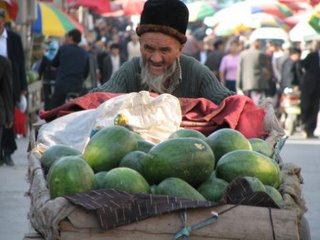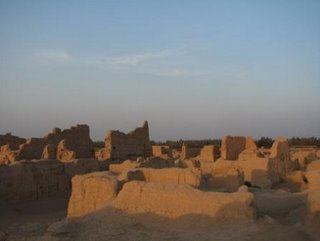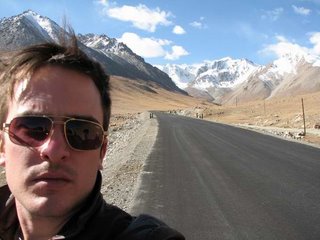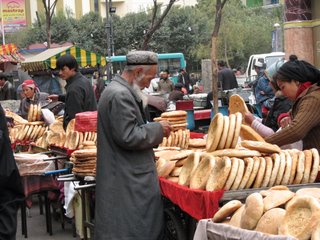From a very good article on this area:
EVERY evening Mehmeti Mersum sits outside a restaurant near his home in Hotan, the ancient town on the southern Silk Road through China’s far western region of Xinjiang. Moslem women in headscarfs and bearded men in skullcaps win smiles or greetings as they pass Mehmeti and his Uyghur friends. Chinese women in skimpy dresses or miniskirts draw only glares of mixed hostility and lechery, while the approach of Chinese men often inspires the Uyghurs to inspect their teacups.
The Uyghurs occasionally glance across the road at the Han Chinese shopkeepers and their families. The Chinese also watch the nightly promenade, gazing back at Uyghur waiters, customers and merchants. And that is normally as near as Hotan’s two ethnically divided communities come to meaningful communication.
[...]
Eight million mainly Moslem Uyghurs form the largest ethnic group in Xinjiang, which has some six million Han residents. Police regularly arrest Uyghurs who express public support for independence or criticise the government, Mehmeti said. The arrests have multiplied since the September 11 terrorist attacks on the United States, with some 3,000 Uyghurs detained according to the Germany-based East Turkestan Infomation Centre.
[...]
“You can’t keep your traditions because you have to develop. Everything must change,” said Dilichati, a young Uyghur studying to become a tour guide. But when he discovered my companion was not Chinese, Dilichati changed his mind. “Just now what I said wasn’t the truth, but I’m afraid to say it,” he said. “Last year one of my friends was arrested after an American woman he spoke to published what he said. He’s still in jail.”
Kashgar guides must pass Chinese examinations, Dilichati said, as bilingual Uyghur and English speakers are not allowed. Men are discouraged from wearing beards or traditional hats. “If you wear traditional dress, the Chinese guides will accuse you of putting dirt in their pot,” he said.
[...]
Professor Dru Gladney of the University of Hawaii Centre for Chinese Studies argues that Xinjiang has all the features of a colony, with deep ethnic divisions and the Chinese enjoying the main benefits of the development of the region’s natural resources. “Uighurs, and other indigenous peoples such as Tibetans, now labelled as ‘minority nationalities’, have been turned into ‘internal colonial subjects’ despite being indigenous peoples in lands they once called their own,” he said. “The expropriation of Xinjiang’s vast mineral and petrochemical resources, with processing of petroleum products in the interior, primarily Lanzhou, and sold on the international market – with revenues to Xinjiang based on domestic prices – further fits the internal colonialism model.”
http://www.gbcc.org.uk/iss21_1.htm
 I spent most of the day to day at the absolutely incredible MoGao Grottoes just outside of Dunhuang. Enumerating the countless Buddhas and bodhisattvas is beyond my powers and there are no cameras allowed, so you'll all just have to come here yourselves if you want to take a look at anything beyond the fragment above, or use your imaginations (and google).
I spent most of the day to day at the absolutely incredible MoGao Grottoes just outside of Dunhuang. Enumerating the countless Buddhas and bodhisattvas is beyond my powers and there are no cameras allowed, so you'll all just have to come here yourselves if you want to take a look at anything beyond the fragment above, or use your imaginations (and google). 




 Asalaam Aleikum! That has to be the most useful single phrase I've ever learnt, at least in this part of the world.
Asalaam Aleikum! That has to be the most useful single phrase I've ever learnt, at least in this part of the world.













